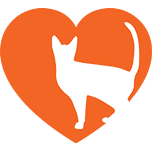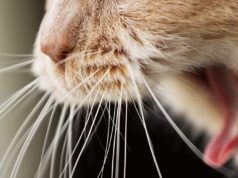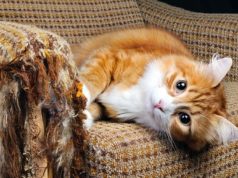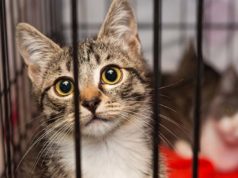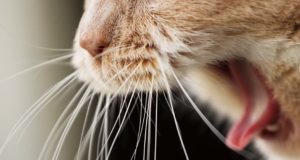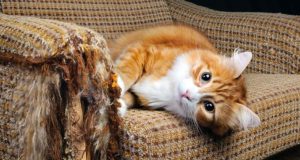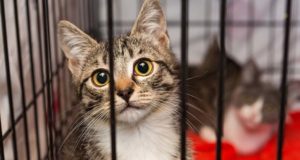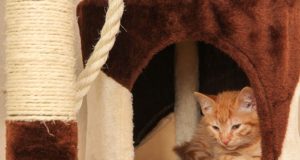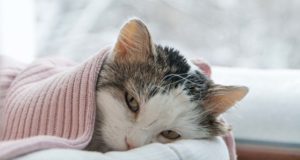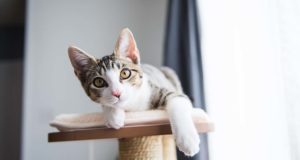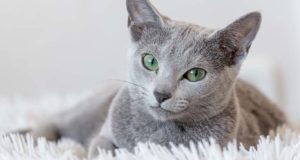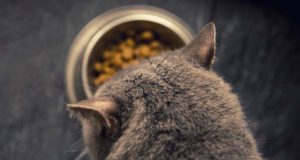The Maine Coon cat breed, or as these cats are also known – the “Gentle Giants”, this is one of the most famous North American breed of cats. Maine Coon is also officially the oldest natural cat breed in North America, although, as accounted by the MCBFA (Maine Coon Breeders and Fanciers Association), that’s only counting the period after the arrival of the European settlers – the Maine Coon was brought together with them.
Viewed as “native” specifically for the state of Maine, the Maine Coon was the most popular cat breed in the United States for a long time. After the arrival of long-haired breeds like the Persian cat and the Angora cat in the early 20th century, however, the Maine Coon quickly lost its popularity.
Nevertheless, in recent years people warmed up to the breed once again, to the point that it’s now considered one of the more popular cat breeds in the world.
That is hardly surprising, considering its many specific characteristics – it has a prominent ruff around its chest, a hefty and robust bone structure, a nice, flowing hair, a long and bushy tail, as well as a rectangular body and a certain squareness to its muzzle.
All that, coupled with its friendly and playful personality, as well as its intelligence, obedience and gentleness, has earned the Maine Coon a lot of comparisons with dogs.
Maine Coon Cat Breed Information
Everything Future and Current Owners Should Know
General Main Coon Cat Breed Questions
Here are some of the most common questions about the Main Coon cat breed that most future and current cat owners may be curious about.
1. Is it true that the Maine Coon is the largest breed of domesticated cats?
Yes, Maine Coons are often cited as being the biggest of all domesticated cat breeds. On average, the Maine Coon male weighs between 13 and 18 lb (5.9 – 8.2 kg) and females weigh between 8 and 12 lb (3.6 – 5.4 kg).
Their height is quite significant as well – an adult Maine Coon can be anywhere between 10 and 16 in high (24 to 41 cm), and in terms of length – up to 48 in (120 cm). The tail alone can reach a length of 14 in (36 cm).
The Guinness World Records accepted a male purebred Maine Coon named “Stewie” as the “Longest Cat” in 2010. Stewie measured 48.5 in (123 cm) from the tip of his nose to the tip of his tail.
Unfortunately, Stewie died three years later (at the age of 8) from cancer. Nevertheless, such impressive proportions only make the comparisons with dogs that much interesting.
2. Did the Maine Coon serve a specific role once it was domesticated?
It’s hard to imagine such a large feline as simply a house cat.
Indeed, the Maine Coon were primarily used as rat-hunting and mouse-hunting cats in farms, ships and shipyards. Their physique, as well as their intelligence and friendliness made them an ideal pet and partner for people at the time, easily rivaling and surpassing dogs in terms of rodent-hunting.
With the passage of time, however, the need for rat-hunting cats slowly decreased and once the long-haired breeds came from the east, people readily accepted them as house pets over Maine Coons due to their uniqueness.
In recent years, Maine Coons started to stand out as “unique” compared to other house cats, thanks to their impressive physique, thus making a resurgence.
3. Aren’t Maine Coons considered “long-haired” cats?
I’ve compared Maine Coons to “long-haired cats like the Persian and the Angora cats” a couple of times, but aren’t they considered to be long-haired cats too? Good question.
The Maine Coon can be described as both long-haired and medium-haired cat. The main reason for the distinction between the Maine Coon and the Persian and Angora breeds is their origin.
Additionally, the coat of the Maine Coon, while long, is still quite different. It’s shorter on the head and the shoulders, but longer on the chest and stomach of the cat.
A lot of Maine Coons have a typical lion-like ruff around their neck, making the breed’s outlook very unique. Also, while they are long-haired, their coat doesn’t actually require that much grooming – due to their light-density undercoat, the hair of the Maine Coon is largely self-maintaining.
4. Are Main Coon cat breed related to its wild ancestors?
So with such a distinguished physique discussed above, is it correct to assume that the Maine Coon is more closely related to domesticated cats’ wild ancestors?
While Maine Coon’s history is not very clear prior to the Europeans’ arrival in North America, their features does seem more “primal” than those of other domesticated cats.
Maine Coons have a lot of physical features that make them better suited for colder, harsher climate – they have a dense, water-resistant fur that’s longer on their underside, making walking and sitting on wet or snowy surfaces easier.
Their longer and bushier tails are often used in cold weather as additional protection when wrapped around the cats’ necks and heads. Maine Coons’ paws are also distinguishably larger than paws of other cats, making them excellent for walking on snow.
In fact, Maine Coons are also popular for a certain genetic trait called polydactylism – polydactylism is a simple autosomal dominant gene that results in extra toes on the cat’s feet. It has no known effect on the overall health of the cat; however, it can further assist a Maine Coon cat in walking on snow.
Many sources claim that at one time the polydactylism trait has occurred in more than 40% of Maine Coon cats in Maine, but was since almost completely bred out because cat shows and competitions had standards that didn’t allow for such physical differences.
Still, Maine Coons are much more likely to be born with polydactylism today and some organizations have even acted purposely for preserving polydactyl Maine Coons.
History of Main Coon Cat Breed
With the general questions about the Main Coon cat breed out of the way, some pet owners are often curious about the history of this breed of cat. Here’s what to know.
1. Is there really no evidence regarding the Maine Coon’s origins prior to its arrival in New England?
None. In fact, there’s little to no evidence on when exactly the Maine Coon cat arrived in North America.
Some speculate that it came together with the first European settlers as a rat-hunting ship cat, although it would still be unclear from which European cat is the Maine Coon decedent.
Other speculate that the Maine Coon’s ancestors were from North America and they simply mixed with European short-haired cats. There’s also the reverse theory – that European long-haired cats mixed with North-American short-haired ones.
Neither of those theories is backed up by a lot of evidence, but both are possible.
Others hypothesize that the Maine Coon were brought to North America by Vikings, long before Columbus. Considering how Maine Coons are native specifically for Maine and not the rest of North America, that’s not a far-fetched hypothesis at all, but there’s still no evidence behind it as well.
Long story short – all we know about the Maine Coon’s origins is that they were native for Maine in the early 19th century.
2. What’s the history of this cat breed’s name?
What’s the story behind their name? The “Maine” part is obvious, but why are they called “Coons”?
There isn’t much of a story to that – their long, fluffy tail and their specific coloring simply made them resemble a mix between cats and raccoons. There’s no such thing, of course, but the resemblance was strong enough for people to call the cat Maine Coon.
3. When did the Maine Coon’s resurgence become after they were driven away from popularity by Persian and Angora cats?
Maine Coons were under a significant thread for the first half of the 20th century, but things started to brighten in the 1960s. The Maine Coon Breeders and Fanciers Association (MCBFA) in particular, was established in 1968.
There doesn’t seem to be a specific reason for the Maine Coons’ resurgence – some people just decided that they want to preserve and spread the breed and they did so quite successfully.
Personality of Main Coon Cat Breed
Here are a few things that pet owners need to know about the personality of Main Coot cat breeds, because they certainly differ from many other domesticated cats.
1. With a nickname such as the “Gentle Giant”, the Maine Coon is sure to have a nice, pleasant personality, right?
Correct. The Maine Coon are as much famous for their friendliness and gentleness, as they are for their size. Both an intelligent and a good-natured cat, the Maine Coon is suitable for owners with very different personalities and preferences.
Maine Coons are very playful, which makes them perfect for people that want to actively play with their pets, but they are also very patient and calm, which makes them a great pet for more passive owners. They are also suitable for homes with small children, as long as they are relatively well-behaved.
Maine Coon enjoy your company and will follow you around the house, but are not clingy and too needy, so if you’re busy they will be perfectly satisfied to just sit close to you and observe your actions.
Given their size, as well as their nature, Maine Coons are not known as climbers, so your curtains will be safe. As a “mouser” cat, the Maine Coon prefers to keep its paws on the ground – that’s where it feels most secure.
That is also where it likes to play – the Maine Coon loves to chase toys around the floor, and thanks to its intelligence, it can easily be taught to play fetch.
Male Maine Coons are known to be much more playful, to the point of almost doggish silliness. Female Maine Coons are more dignified, calm and cat-like, although they are still playful and fun cats in quite a lot of the time.
2. Is there any form of training or specific care that I need to do in order to make sure my cat’s personality is what I want it to be?
Cats are quite different from dogs and do not require that much specialized training. Cats will instinctively use their toilet crate from the first time you show it to them.
They don’t bark, they won’t attack a guest unless actively provoked and pushed, they don’t need to be walked outside and therefore – don’t need to be trained to behave there.
However, they are still social animals that will be a part of your household and family for years to come. As a result, there are some things that you might want to pay attention to.
As with dogs, we can sum those up in 3 main categories:
1. Parents. If you want to get an idea of what your little kitty’s personality will look like when it grows up, take a look at its parents. Mainly pay attention to the mother, but if possible – check out the father and the rest of the kitty’s siblings. Also, when presented with an entire litter, don’t necessarily go for the biggest and most active kitty, nor for the smallest outcast – just like people, cats’ personalities start developing from the earliest age, so it’s usually best to pick a kitty that’s right in the middle – it hasn’t be abused by its siblings and ignored by its parents, but it also hasn’t been a bully.
2. Training. As we said above, there’s not much specialized training that needs to be done for a cat. Still, as a more intelligent and playful cat, the Maine Coon enjoys learning new tricks. When training your cat for such things, it’s important to remember to never train your cat through negative reinforcement – never hit them, neither with a naked hand, nor with objects, and avoid harsh language and tone. Cats react to such “training” even worse than dogs do. Instead, simply stock up with patience.
3. Socializing. It is quite important for any feline, and that’s true for Maine Coons as well. Maine Coons may not be as frightful of outsiders as some other cat breeds, but they are still untrusting and uneasy around them. For that reason, if you don’t want your Maine Coon to be trouble around guests, it’s advisable to socialize it from an early age. By socializing we don’t mean forcing your Maine Cook kitty in uncomfortable situations, but if you simply have guests often enough, your cat will quickly learn that outside people are not a problem and will behave well around them.
Health of Main Coon Cat Breed
One of the most important parts to cover is the health of Main Coon cat breed.
1. If the Maine Coon cats are not so overly bred as other breeds, does that mean that they have a better health?
To an extent, yes. Maine Coons are not as sickly as other breeds, but they are far from immune to sickness as well.
Here are some of the main health problems you should look out for:
- Hip dysplasia
- Hypertrophic cardiomyopathy – a heart disease
- Polycystic kidney disease
- Spinal muscular atrophy – a genetic disorder of the skeletal muscles
2. How do I make sure that my cat will be as healthy as possible?
With cats, as with dogs, it’s important to talk to a good cat breeder before purchasing your future feline friend. For example, you can consult with the Pet Professional Guild and the MCBFA on how to find a trustworthy pet breeder.
An adequate professional cat breeder will provide you with health clearances for both parents of the kitty and prove that it’s been tested and cleared of many of the possible conditions it might have.
After you’ve gotten your Maine Coon friend, make sure to find a trustworthy veterinarian, preferably one that works 24/7, and consult with them about all of your cat’s needs.
Care of Main Coon Cat Breed
Caring for Main Coon cat breed is similar to your regular cat care of other domesticated cats, but there are a few things that pet owners should know.
1. Above you mentioned that the Maine Coon’s coat doesn’t need as much care as Persian and Angora cats’ coat – does this mean no care at all?
No, not at all. The Maine Coon’s coat is much more self-maintained compared to other long-haired cats, but if you want your cat to look and feel good, as well as to have healthy hair and skin, you still need to groom to regularly.
Comb your Maine Coon twice a week, and bathe it once every several months and it should have an excellent coat.
2. Outside of taking care of its coat, what else should I do for my Maine Coon?
Make sure to regularly brush your cat’s teeth. Daily brushing would be best, but if you don’t have the nerve for it, make sure to do it at least once per week.
Trimming Maine Coon’s nails is also advisable, more so than it is for other cats.
Wipe the corners of the eyes of your cat if you see any teary discharge. Use different cloths for each eye to prevent the spreading of possible infections between the eyes.
Check the Maine Coon’s ears once a week and clean them if necessary.
3. Does the Maine Coon have any special diet needs?
Being a large cat, the Maine Coon’s food must be of high quality. That is, of course, true for all cats, but it’s especially true for a Maine Coon.
Avoid grain-based and soy foods. Cat foods with meat as their main content are best.
A mix of dry and wet food is advisable, with dry food holding a slight priority in order to reduce the tartar build-up on the cat’s teeth.
Children and Other Pets for Main Coon Cat Breed
 Finally, how does the Main Coon cat breed deal with other pets, animals and in particular children? For any family with kids or dogs wanting to adopt this breed, note the below.
Finally, how does the Main Coon cat breed deal with other pets, animals and in particular children? For any family with kids or dogs wanting to adopt this breed, note the below.
1. How suitable is the Maine Coon for a house with small children exactly?
As with all other cats and dogs, if the children are too rowdy and overactive, even a kind, calm and good-natured Maine Coon can get irritated after a point. Still, of all cat breeds, Maine Coons are arguably the most suitable breed for households with small kids.
As long as you teach your children to be gentle and respectable towards the Maine Coon, the cat will be happy to play with them in a lot of different ways including chasing, fetch, snuggling and petting, and even dress-up.
2. How about other pets?
The Maine Coon is happy to share a home with another cat or a dog. It’s both playful and gentle enough to be a good companion for all types of pets.
Just make sure to introduce them in a suitable, slow and controlled manner.
Conclusion on the Main Coon Cat Breed Profile
Maine Coon are one of the most popular cats around the world for a reason.
Their unique physique makes them a prize pet, and their nice, well-mannered nature makes them an ideal companion and friend for children and adults alike.
